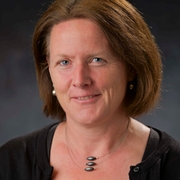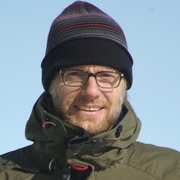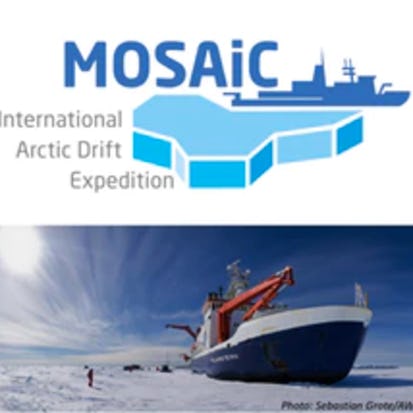- Level Foundation
- المدة 16 ساعات hours
- الطبع بواسطة University of Colorado Boulder
-
Offered by

عن
Why would hundreds of scientists from around the world intentionally freeze a ship in Arctic sea ice for an entire year, braving subzero temperatures and months of polar darkness? This may sound like a fictional adventure movie plot, but from September 2019 through October 2020, the MOSAiC (Multidisciplinary drifting Observatory for the Study of Arctic Climate) Arctic research expedition did just this. In this course, you’ll hear directly from MOSAiC scientists and Arctic experts as they describe why this expedition is so key for increasing our understanding of the Arctic and global climate systems and what kinds of data they will be collecting during MOSAiC on the ice, under the sea, and in the air. The course kicks off with content around Arctic geography, climate, and exploration history, and then walks learners through the basics of the components of the Arctic system: atmosphere, ocean, sea ice and ecosystems. You will also learn how the data collected during MOSAiC will be used to improve climate model projections. Finally, we will wrap up the course by exploring challenges the new Arctic faces, including how indigenous peoples in the Arctic are being impacted in different ways by a changing Arctic environment.الوحدات
Course Introduction Lectures
2
Discussions
- Introduce yourself
- Reflection on Climate Science Collaboration, Part 1
6
Videos
- Welcome to the Course!
- Module Overview
- What and Where is the Arctic?
- Geopolitics of the Arctic - Great Powers, Strong Institutions, Scientific Cooperation
- The MOSAiC Expedition: An Overview
- Exploring the New and Old Arctic - MOSAiC and the Historic Fram Expedition
4
Readings
- Syllabus
- Virtual tour of Polarstern and Fram Ships
- Read about the MOSAiC expedition in the news
- MOSAiC Resources for Educators
Atmosphere in the Arctic and Beyond Lectures
1
Assignment
- Atmosphere
1
Discussions
- How does the atmosphere affect the temperature and/or thickness of Arctic sea ice?
7
Videos
- Module Overview
- Role of the Arctic in Earth’s Energy Budget
- Up in the Air: Earth's Atmosphere
- Shedding Light on Arctic Clouds
- Arctic Feedbacks
- Why Study the Arctic Atmosphere? Goals of the MOSAiC Atmosphere Team
- Sea Ice Movement (Credit: DLR, TSX/TDX AO: suman_OCE3562)
3
Readings
- Atmosphere Quiz Background Context
- Read about the MOSAiC expedition's atmosphere team in the news
- Visit the MOSAiC ice camp
Ocean Lectures
1
Assignment
- Arctic Ocean
1
Discussions
- How could declining sea ice cover impact large scale ocean circulation?
7
Videos
- Module Overview
- How the Arctic Ocean Flows
- How the Arctic Ocean Mixes
- Where the Arctic Air and Ocean Meet
- Ocean Chemistry and Productivity Part I
- Ocean Chemistry and Productivity Part II
- Why study the Arctic Ocean? Goals of the MOSAiC Ocean Team
2
Readings
- Arctic Ocean Quiz Background Context
- Read about the MOSAiC expedition's ocean team in the news
Sea Ice
1
Assignment
- Sea Ice
1
Discussions
- Dinner conversation about the science of MOSAiC & report back in discussion thread.
9
Videos
- Module Overview
- The Story of Sea Ice
- How Sea Ice is Made
- Sunlight and Arctic Sea Ice
- Ridges and Leads: Sea Ice Dynamics
- Sea Ice Kinetics
- Sea Ice Thermodynamics - Coupling Sea Ice-Atmosphere-Ocean
- Why study Sea Ice? Goals of the MOSAiC Sea Ice Team
- Ice Moving on Radar! - Daily radar images capture sea ice movement and deformation in the region around the Polarstern (credit: Jari Haapala)
2
Readings
- Sea Ice Quiz Background Context
- Read about the MOSAiC sea ice team in the news & in first science paper
Arctic Biochemistry Lectures
1
Assignment
- Arctic Ecosystem
1
Discussions
- Discuss how decline in sea ice will affect the Arctic food web.
8
Videos
- Module Overview
- Life Beneath the Ice
- Life in Sea Ice
- Adaptations to Life in Sea Ice
- Arctic Sea Ice Ecology
- What Starts Up, Must Go Down: Productivity in the Arctic Ocean
- All About Atmospheric Aerosols
- Why study the Arctic Ecosystem? Goals of the MOSAiC Biogeochemistry and Ecosystem Team
2
Readings
- Arctic Ecosystem Quiz Background Context
- Follow the MOSAiC's ecosystem & biogeochemistry team in the news.
Modeling Using Data from the Arctic Lectures
1
Assignment
- Modeling
1
Discussions
- How could MOSAiC scientists decrease uncertainty in their model outputs?
6
Videos
- Module Overview
- Why study the Arctic? Goals of the MOSAiC Modeling Team
- Arctic Short-Term Forecasting
- Arctic Regional Modeling
- Climate Modeling to Understand a Changing Arctic
- What is Process Modeling?
2
Readings
- Modeling Quiz Background Context
- Follow the MOSAiC modeling team and colleagues from Year of Polar Predictions in the news
Challenges in the Arctic
1
Peer Review
- What have you learned?
1
Discussions
- Reflection on Climate Science Collaboration, Part 2
9
Videos
- Module Overview
- Arctic Climate System and Pan-Arctic Connections
- A Changing Climate, A Changing Arctic
- Does a Warming Climate Mean a More Accessible Arctic?
- Pollution in the Arctic
- Arctic Ocean Acidification: Ecosystems and Economies
- A Changing Climate, Changing Ways of Life
- A Changing Climate, Changing Ecosystems
- Course Wrap-Up
1
Readings
- Follow the MOSAiC expedition in the news & News about a changing Arctic
Auto Summary
Embark on an extraordinary journey into the heart of the Arctic with "Frozen in the Ice: Exploring the Arctic," a captivating course offered by Coursera in the Science & Engineering domain. This unique educational experience delves into the groundbreaking MOSAiC expedition, where hundreds of scientists from around the globe intentionally froze a ship in Arctic sea ice for an entire year to advance our understanding of the Arctic and its impact on global climate systems. Led by MOSAiC scientists and Arctic experts, the course provides a comprehensive exploration of Arctic geography, climate, and the history of polar exploration. It covers the critical components of the Arctic system, including the atmosphere, ocean, sea ice, and ecosystems, and explains how data collected during the expedition will enhance climate model projections. Additionally, learners will examine the challenges faced by the Arctic, with a special focus on the effects of environmental changes on indigenous communities. This foundational course spans 960 minutes of engaging content and is available through Coursera's Starter and Professional subscription plans. It is ideal for individuals passionate about climate science, environmental studies, and polar exploration, offering valuable insights into one of the most ambitious scientific endeavors of our time. Join us to uncover the mysteries of the Arctic and its vital role in our planet's climate future.

Anne U. Gold

Dr. Matthew Shupe


